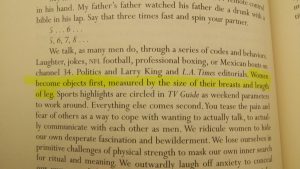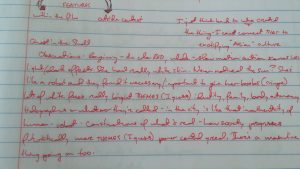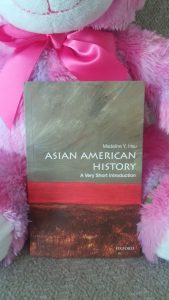Week 9: Another post on misogyny
Look I gotta deal with this everyday. Why I stopped reading this week’s book definitely wasn’t an excuse to just not read for the week while everything else in life goes on. Although Week 9 was a particularly difficult week and everyday misogyny did play a role in that… I felt I had to establish a boundary somewhere like I always have to try to do in my life and I drew it with this book. Here is the line that started it all:

I literally put the fucking book down and walked away. One thing I really really hate is how people are viewed and judged as body parts rather than as whole people. For the case of people of color (especially qtpoc and woc) and people with marginalized identities (especially those with disabilities and of size) there have been many ways we have been dehumanized and objectified. As a woman of color, this line and several other instances of the book up until the part where I stopped reading, this is something I could not overlook/step back and view from a critical perspective/not take too personally.
Maybe on another week I would have just passed it, made an annotation about the misogyny, move on and finish the book in the day and a half I gave myself time to read. Maybe on another week I would have rationed out the pages over a span of six days like I have done with the other books and that line and the other lines wouldn’t have been so offensive to me. THIS week was particularly stressful on the living-as-a-woc-navigating-a-world-of-misogyny front. On Wednesday I had to talk to an advocate from CASV to vent and cry in front of someone who would understand. Throughout that morning in class I was fighting back my feelings trying not to feel them because these things just keep coming up. I will never not escape sexist comments, news of sexual harassment/assault allegations, rape culture, sexist media, casual misogyny from peers, anything anything anything related to any of that.
Maybe on another week I could stand up to this book like I’ve done before and approach misogyny from a critical perspective. Take note of the time period the book takes place in, take note of who the voice of the story is, and not take it so personally. Maybe on another week I can critically analyze the ways in which my oppressor sexually objectifies my gender and talk about how that it’s wrong while also not discounting his voice and humanity as a whole. Maybe on another week I wouldn’t be so hard on my oppressor for viewing my gender as separated body parts to be measured and instead view THIS as an assignment for my program AND not let it get in the way of this week’s seminar and my education.
Maybe on another week I could see all of this from another perspective and not take it so damn personally. Maybe I could see that I’m overreacting and this isn’t a big deal like I’m making it out to be.
Right. No. I don’t think so. Not this time.
I’m not here to blast anyone for reading through to the end of this book. I’m not here for that. I am taking this personally because it is personal to me. It sucks that I wasn’t able to look past the personals and unable to fully participate in seminar. It sucks that I wasn’t able to be a critical consumer of this book. But I just wanted to put down my feelings about why I stopped reading it. No man could ever say that shit to me and I’ll just hear him out and listen to his life story whether some of it is fictional or not. This book didn’t get a pass from me. Again, I have to stress that I deal with misogyny every day. I deal with it outside of school, I deal with it in my personal relationship, I deal with it internalized in my own damn self.
I had to draw the line somewhere in how I come across misogyny everyday. There are some ways I can’t avoid it but I can control how I deal with it. I’m still learning how to do that. Sometimes I just got to shut it out. Because it hurts me that much.




